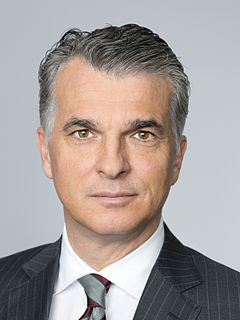A Quote by Vince Cable
There was, of course, a global financial crisis. But our Labour predecessors left Britain exceptionally vulnerable and damaged: more personal debt than any other major economy; a dangerously inflated property bubble; and a bloated banking sector behaving as masters, not the servants of the people.
Related Quotes
The most serious problems lie in the financial sphere, where the economy's debt overhead has grown more rapidly than the 'real' economy's ability to carry this debt. [...] The essence of the global financial bubble is that savings are diverted to inflate the stock market, bond market and real estate prices rather than to build new factories and employ more labor.
It is no exaggeration to say that since the 1980s, much of the global financial sector has become criminalised, creating an industry culture that tolerates or even encourages systematic fraud. The behaviour that caused the mortgage bubble and financial crisis of 2008 was a natural outcome and continuation of this pattern, rather than some kind of economic accident.
I believe that the financial crisis of 2008/9 exposed more a lack of ethics and morality - especially by the financial sector - rather than a problem of regulation or criminality. There were, of course, regulatory lessons to be learned, but at heart, there was a collective loss of our moral compass.
The global financial crisis is a great opportunity to showcase and propagate both causal and moral institutional analysis. The crisis shows major flaws in the way the US financial system is regulated and, more importantly, in our political system, which is essentially a bazaar of legalized bribery where financial institutions can buy themselves the governmental regulations they want, along with the regulators who routinely receive lucrative jobs in the industry whose oversight had formerly been their responsibility, the so-called revolving-door practice.
This is the first global crisis that doesn't start in poor countries and it was caused by the rich countries. So it's necessary to take advantage of this crisis - the financial system has to be regulated. It's necessary that the central banks in the world should control a little bit the banks' financing, because they cannot bypass a certain range of leverage. And I believe that there's no other - more any reason for a G-8 group or any other "G." I believe that we should guarantee that the G-20 should be now an important forum to discuss the major economic issues of the world.
Ontario's auto sector is a cornerstone of our economy - a key source of our ability to export, innovate and create jobs. In this highly competitive global economy, we need to drive further investment and ensure the sector remains strong. I am confident that this new partnership, with Ray Tanguay's strategic advice and leadership, will allow Ontario to increase our competitiveness, productivity, and market share in the auto sector, and I look forward to their important work contributing to a more prosperous, innovative Ontario economy.
The Fed contributed to the financial crisis, keeping interest rates too low for too long. I give them credit for responding and stabilizing the economy and the financial sector during the crisis. But then they tried to do too much with quantitative easing that went on forever, just dramatically exploding their balance sheets.
































